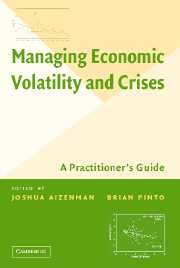Book contents
- Frontmatter
- Contents
- Contributors
- Acknowledgments
- Foreword
- MANAGING ECONOMIC VOLATILITY AND CRISES
- Overview
- PART I WHAT IS VOLATILITY AND WHY DOES IT MATTER?
- PART II COMMODITY PRICES AND VOLATILITY
- PART III FINANCE AND VOLATILITY
- 6 Finance and Volatility
- 7 Evaluating Pricing Signals from the Bond Markets
- PART IV MANAGING CRISES
- Technical Appendix
- Index
- References
6 - Finance and Volatility
Published online by Cambridge University Press: 25 July 2009
- Frontmatter
- Contents
- Contributors
- Acknowledgments
- Foreword
- MANAGING ECONOMIC VOLATILITY AND CRISES
- Overview
- PART I WHAT IS VOLATILITY AND WHY DOES IT MATTER?
- PART II COMMODITY PRICES AND VOLATILITY
- PART III FINANCE AND VOLATILITY
- 6 Finance and Volatility
- 7 Evaluating Pricing Signals from the Bond Markets
- PART IV MANAGING CRISES
- Technical Appendix
- Index
- References
Summary
ABSTRACT: Risk sharing is an important function of any financial system, although there are natural limits to the degree of risk sharing across individuals, corporations, and countries. How effective a financial system is in providing risk diversification can depend on its capitalization and its institutional development, including the quality of its regulation and supervision. A financial system will typically not provide full risk insurance, and may even propagate economic variability or create risks of its own. Before or during a crisis, financial markets and institutions can play a large role in causing or amplifying financial crises because of balance sheet effects and contagion, among others. Following a crisis, the state of the financial sector can impede the efficacy of restructuring policies and the ability to resume growth. This study reviews the literature on these issues and highlights the areas where knowledge is still limited.
CONCEPTS AND DEFINITIONS
Even though the financial sector has long been regarded as a key part of any economy, the importance of its links to economic performance is only coming to be fully appreciated and analyzed in the last decade or so. This statement is even more true of the relationship between finance and volatility. The purpose of this study is to present recent analytical thinking and empirical evidence regarding these topics to practitioners. The chapter opens with the basic concepts explaining why financial contracts, markets, and intermediaries arise (for definitions of terms, see Box 6.1).
Information
- Type
- Chapter
- Information
- Managing Economic Volatility and CrisesA Practitioner's Guide, pp. 213 - 280Publisher: Cambridge University PressPrint publication year: 2005
References
Accessibility standard: Unknown
Why this information is here
This section outlines the accessibility features of this content - including support for screen readers, full keyboard navigation and high-contrast display options. This may not be relevant for you.Accessibility Information
- 1
- Cited by
